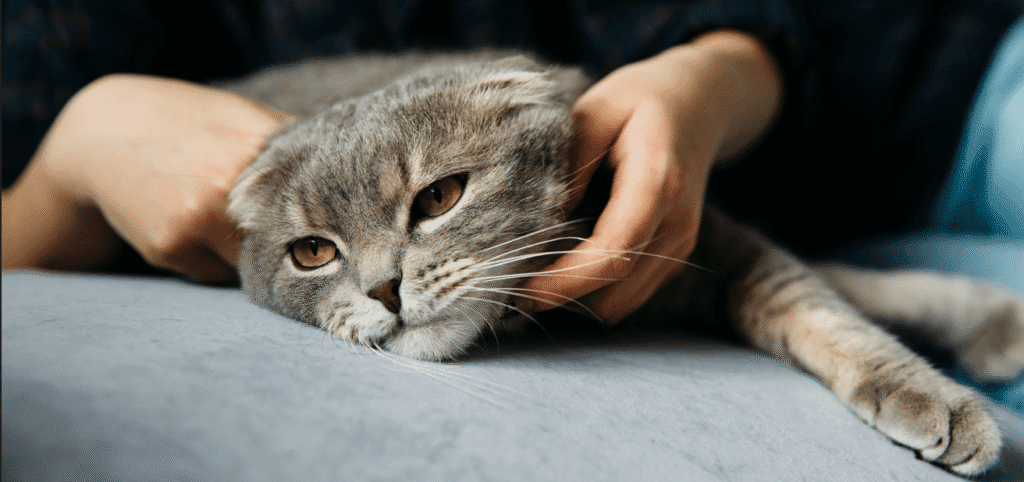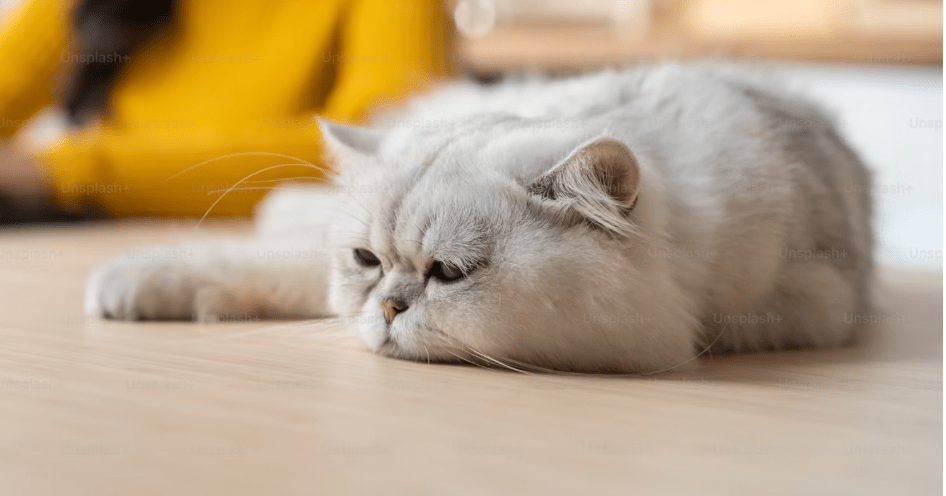Table of Contents
What is Depression in Cats?
Depression in cats is a serious mental state that can affect their behavior and overall well-being. Cats who are normally active and outgoing may become quiet and calm, showing a lack of interest in things they once enjoyed.
As a pet owner, it’s essential to recognize the signs of sadness or suffering, like cowering, fleeing, or even hissing when approached. These are common signs of a depressed cat, and it’s important to notice these changes early to help them feel happy again.
The persistent lack of happiness can be a result of emotional stress and a deeper emotional need for attention. Cats may behave differently when they feel unhappy or stressed, making it crucial for caretakers to have the knowledge to understand the causes behind their cat’s depressed state and take steps to improve their well-being.
Signs of Depression in Cats
Low energy levels: When your cat starts showing low energy, it could be a red flag for deeper issues. A sudden change in their sleep pattern or behavior often suggests they are feeling depressed. This shift in energy may indicate either a mental problem or a physical problem.
I’ve observed this in my own pet, where an unhappy cat began to sleep more and became much less playful, signaling a clear change in behavior. If this happens, it’s important to pay attention as it could be a sign of distress.
Changes in appetite: When a cat starts to lose interest in food, it may be a sign of depression. Cats that are mentally disturbed can eat less or show low appetite, especially when they stop responding to their favorite treats or regular diet. From my experience, a depressed cat often becomes sad and shows little to no interest in eating, which is a clear indicator of emotional distress.
Change in daily routine: If your cat has suddenly stopped using its litter box or abandoning its favorite sleeping spot, it may be experiencing stress. A usually cheerful and playful cat might begin to lose interest in its usual activities, seeming down or withdrawn. These changes in behavior are often clear signs that something is troubling them, and they need attention to determine the cause.
Aggression: When a cat is feeling sad or overwhelmed, it may display sudden aggression. This can include snappy behavior, biting, hissing, or growling due to fear or anxiety. Sometimes, cats will become aggressive, chasing others or acting out of character because of external stimuli.
If your cat seems scared, it’s a sign that they may need help to find their peace, and a visit to the vet can help address the root cause of the behavior.
Changes in Voice: When a chatty cat becomes unusually quiet or starts making low-pitched, mournful yowls, it may indicate mental anguish or pain. Likewise, a quiet cat that begins meowing more frequently or in a louder voice could be expressing underlying restlessness or anxiety, seeking comfort. Observing shifts in pitch or loudness can help you understand their emotional state better.
Reasons of Depression in Cats

1. Loss of a Family Member
When a family member such as a person, canine, or even a family cat passes away or moves out, a feline can experience grief and emotional distress. Cats, though known for their solitary nature, are actually quite social and form strong social connections with their housemates.
The loss of a loved one can disrupt their living situation, leading them to grieve and feel isolated. I’ve personally seen how a cat can become withdrawn or anxious after a beloved housemate leaves or dies, which deeply affects their overall well-being.
2. Change in Environment
Cats can feel depressed when there are significant changes in their environment.For instance, moving to a new home, particularly a smaller house or apartment, can reduce their space to roam and explore. They might no longer have the same access to the outdoors, which can lower their level of activity and make them feel stressed.
The introduction of a new pet or a baby can also create tension, leading to anxiety. As a pet guardian, it’s important to notice these shifts and provide comfort to help your cat adapt to its new surroundings.
3. Lack of Stimulation
Cats are naturally active creatures that need both mental stimulation and physical activity to thrive. Without enough engagement, they can easily become bored, which may lead to depression. I’ve noticed how my own feline gets down when there’s nothing to keep her busy, proving how important it is for them to stay stimulated and active.
4. Changes in the Family’s Schedule
When a cat experiences changes in the family’s schedule, like vacations or being left absent for long periods, their mental state can be negatively affected.
The disruption of their daily routine, especially if they are left in a boarding place or with a pet sitter, can cause anxiety and depression. These changes in time and attention may lead to a shift in the cat’s mental well-being, and when the family comes back, it may take some time for the cat to adjust.
5. Illness and Medical Issues
Depression in cats can often be linked to an underlying medical condition. For example, arthritis or dental problems can cause pain and discomfort, making your cat feel sick and blue. This can result in them not acting like their usual selves.
Infectious diseases, such as urinary tract infections or diabetes, may also be the cause of the changes in their behavior. If you suspect something is wrong, a visit to the vet is necessary to rule out any illness and get your cat back to feeling better.
6. Injury
An injury or old surgeries can affect your cat’s ability to stay happy. When lingering pain or discomfort sets in, your cat may no longer act in its usual energetic way. If you notice signs of pain, it’s important to have your cat checked out by a veterinarian. They might recommend chronic pain relief or a medical procedure to ease the pain. Make sure to schedule an appointment promptly to address the issue and follow the veterinarian’s recommendations for pain relief.
Can Cat Be Depressed?
Yes, cats can get depressed. Just like us, they can go through mental health challenges like anxiety and depression. Feline depression can be triggered by several factors, like the loss of a family member or significant alterations in their surroundings, such as moving to a new house.
A change in the family schedule or even sickness can also affect a cat’s emotional state. It’s not uncommon for a cat to experience depression after a change in their environment or routine. Some cats may be more vulnerable due to a genetic predisposition to mental health issues.
Be on the lookout for depressive signs like lack of appetite, hiding, or not playing as usual. If your cat is showing signs of physical health decline, it might be linked to their mental health struggles as well. Recognizing these early signs can help address the problem before it worsens.
How You Can Help Your Pet
While cats can go through periods of depression, there are several ways you can support them in boosting their mental well-being.:
- Spend Quality Time With Your Cat: Spending time with your kitty is key to helping a depressed cat feel better. Interacting through petting, talking, and offering ear rubs or scratches on their side of the face or under the chin can make them feel loved and content. Cuddling with your cat on your lap while paying attention to their antics helps soothe their anxiety and strengthens your bonding. When you brush your cat, you’re not only providing comfort but also helping them enjoy the moment, creating a deeper connection and making them feel secure.
- Introduce New Toys and Games: To help your cat battle depression, introducing new toys can make a big difference. Regularly rotate the selection of toys like cat dancer, ribbons, or feathers on a stick to keep your cat engaged.
Offering toys with different sizes, textures, and colors such as fishing pole type toys or
puzzle toys can stimulate their interest and encourage them to move and attack. You can also add tasty treats to make playtime more rewarding. Consider using mobile devices or cat TV with patterns and noises to enhance their play and provide extra fun.
- Offer New Types of Food: If your cat is showing signs of depression, try offering different types of food to boost their interest. You can experiment with various flavors and brands, focusing on meat-based options like boiled chicken or roasted chicken.
Cats love these natural proteins, and they may respond positively. Adding small amounts of human food such as yogurt or cheese can also help. Be sure to monitor the amount and response to ensure it’s a good fit for your cat. Consulting your vet for the right food suggestions based on your cat’s condition is always a wise choice.
- Consider Adopting Another Cat: If your resident cat is grieving the loss of their previous feline housemate, getting another cat could help ease their sadness. Some cats are very social and thrive on companionship, while others might prefer being the only pet.
Before making a decision, take some time to consider the new cat’s personality, age, health, and energy level to ensure they’re a good fit for your home and your current cat. Bringing home an animal companion can make your cat feel happier by providing them with someone to interact and cuddle with, but it’s important to avoid thinking of the new cat as a replacement.
